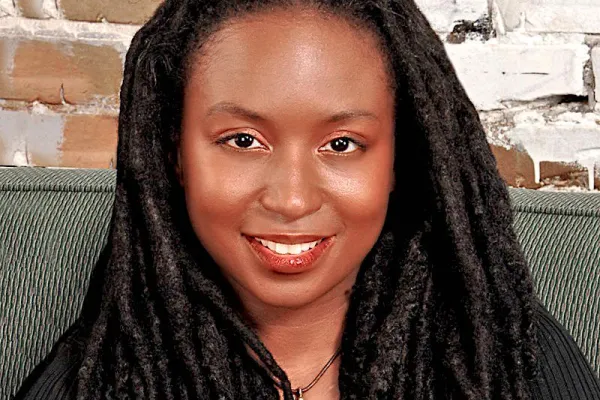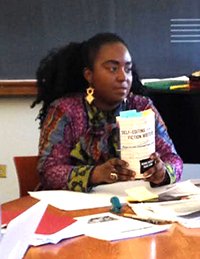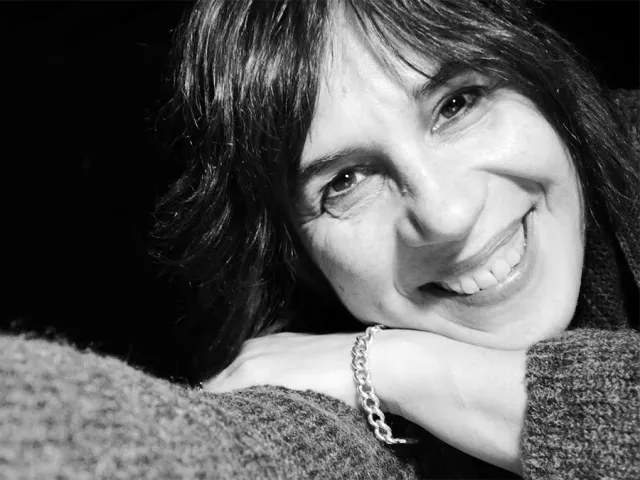“Writing the Marvelous at Smith”: Reflections by Sheree Renée Thomas
News of Note

Published April 22, 2015
The Lucille Geier Lakes Writer-in-Residence Program was created to bring distinguished writers—including poets, playwrights, novelists and journalists—to Smith for a semester each year.
Established in 2013 with a $1 million gift from alumna Jane Lakes Harman ’66 in memory of her mother, the program is designed around intensive workshops where visiting writers teach small classes and hold one-on-one conferences with students.
Sheree Renée Thomas, this year’s Lakes Writer-in-Residence, is teaching a course titled “Writing the Marvelous Real.” Thomas is the author of Shotgun Lullabies: Stories and Poems and editor of the groundbreaking anthology Dark Matter: A Century of Speculative Fiction from the African Diaspora and its sequel, Dark Matter: Reading the Bones.
In an essay she wrote for Grécourt Gate, Thomas reflects on her experiences teaching at Smith.
“It has been particularly inspiring to work with talented, young women who have such distinctive, diverse aesthetics as writers and readers,” she writes. “These writers nurtured, challenged and supported each other as they worked to imagine the impossible, to make ‘fabulism’ natural and ‘real.’”
Thomas also cites Smith’s dedication to offering “a myriad of writing experiences for students” as evidenced by her collaborations with faculty in the theatre and Afro-American studies departments and the Jacobson Center for Writing, Teaching and Learning.
Here is Thomas’ essay about her tenure as Lakes Writer-in-Residence:
Writing the Marvelous at Smith
by Sheree Renée Thomas
“One of the greatest things you can give a writer is the gift of time. With an almost unprecedented, endless New England snowy winter, I had more time than I could have anticipated. For this Tennessee writer, finding the “marvelous” in a beautiful ice- and snow-covered landscape was an exercise of imagination all on its own, and serving as the 2015 Lucille Geier Lakes Writer-in-Residence has not simply been a fellowship, but a personal joy.
Magical realism, “the marvelous real,” is a powerful body of literature that reveals our world through a remarkable lens. Teaching, reading, writing and discussing it at Smith with such good companions was a privilege and an honor.
It has been particularly inspiring to work with talented young women who have such distinctive, diverse aesthetics as readers and writers. I could not have asked for a better workshop group! Passionate, witty, astute and yet kind “beta” readers, they approached each draft with professionalism and a commitment to helping each writer create on the page the story they had in their mind.

As a genre, magical realism celebrates the fantastic in our everyday, ordinary lives while delivering evocative storytelling and strong socio-political commentary. These writers nurtured, challenged and supported each other as they worked to imagine the impossible, to make “fabulism” natural and “real.” It was gratifying to see how willing Smithies were to stretch themselves and take creative risks, telling stories that might not have naturally occurred to them in their other lives as students and scholars, as young women on a journey, figuring it out.
Some think of creative writing as a frivolous activity, devoid of the kind of seriousness, focus and thoughtfulness that is applied to other forms of art and scholarship. As any writer would tell you, writing is hard! But it is also fun, meaningful, surprising, confounding work, and it can fill a writer’s life with joy.
Smith’s dedication to offering a myriad of writing experiences for students was evident as I visited playwrights, screenwriters and directors in the theatre department, scholars and poets in Afro-American studies, and the wonderful writers and scholars in the English department and the Jacobson Center for Writing, Teaching, and Learning.
My “Marvelous Real” students represented all of the classes at Smith, from first year to senior, from philosophy and science majors to the undecided.
One of my highlight experiences—beyond reading stage directions for Jacobson Visiting Nonfiction Writer Dava Sobel’s new Copernicus play, “And the Sun Stood Still”—was participating in Smith’s wonderful “Writers on Writing” course. Along with Julio Alves, director of the Jacobson Center, and Andrea Hairston, Louise Wolff Kahn Professor of Theatre and professor of Afro-American studies, I discussed “The Story as Magic, as Medicine.” Over the course of seven guest lectures with creative writing professionals from a number of fields, students had an opportunity to explore multiple genres and hear insights from those who have made writing professionally their lives.
My colleagues in the English department also hosted engaging panels and literary lunches that helped open the door on the writing life, offering candid, lively discussion about the different paths writers take in creating and publishing their work. It was good to see and hear the fine poets, writers and scholars at Smith discuss their writing lives.
Our society, indeed, the whole world, is based on a series of stories that we constantly retell, revise and re-imagine to sustain traditions and at times, to create necessary change. I admire the hard work, dedication and true investment that the writers in my “Marvelous Real” class showed over this semester. Writing and revising original new work is no small task, and my students rose to the occasion admirably, completing new tales that broadened and deepened our understanding of what it means to be human.
But our work isn’t done. During my residency at Smith, I am thrilled to have had time to write over 30,000 words on a new project, and I am revising short stories and an essay that is forthcoming this year. Our class is also revising and editing their short stories for a trade paperback chapbook that we will publish in the next few weeks—talk about marvelous!
I am so pleased to have had the opportunity to work with each of these young women, and whatever bright paths these writers choose to make in our world, today and tomorrow, I am certain they will master their own grand tales.”
Next spring’s Lakes Writer-in-Residence is Pamela Petro, a lecturer in English language and literature at Smith, who also teaches creative non-fiction in the graduate creative writing program at Lesley University.
More about Pamela Petro
Petro, who speaks a bit of French and Welsh, is the author of works including The Slow Breath of Stone: A Romanesque Love Story and Travels in an Old Tongue: Touring the World Speaking Welsh.
A 2014 MacDowell Colony Fellow and an Honorary Fellow at the University of Wales, Petro earned an undergraduate degree from Brown University and a master’s degree from The University of Wales.
For her part, Petro said she is “thrilled by this opportunity to continue working with Smith’s amazing students and to be continuing the word and image work I began as an undergraduate.
“I can’t wait to get started!” she added.

Pamela Petro. Photo credit Thomas Sayers Ellis.
Petro will teach a course in 2016 at Smith called “Picturing the Text: A Word and Image Workshop” that will draw on her experience with graphic essays, artist’s books and word and image installations.
“Every day we receive information from words and pictures working in tandem: on road signs, in newspapers and on websites, on storefronts and cereal boxes,” Petro writes, in her course description. “Yet we don’t often ask students to study the meaningful impact of word and image communication, nor how words and images work together to impart meaning.”
The Lakes Writer-in-Residence Committee is now seeking nominations for a writer for spring 2017. Nominations are welcome from any department, program or group of academic units. The deadline is October 16. Submit nominations or questions to committee chair Andrea Hairston, ahairso@msn.com.